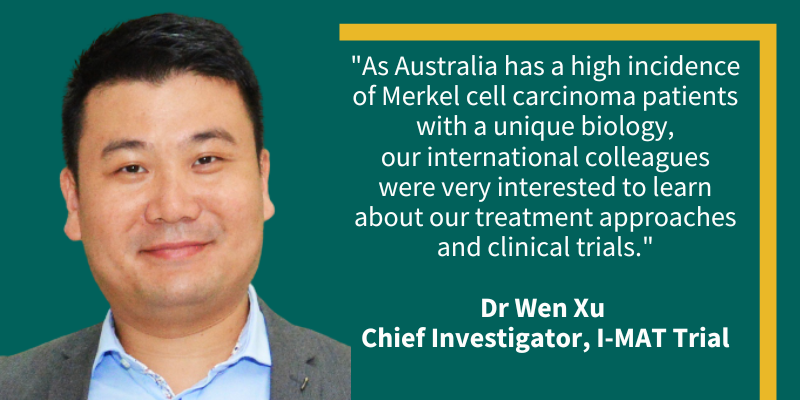Australia has the highest incidence of Merkel cell carcinoma in the world. Although a rare skin cancer, the international medical community is paying more attention to Merkel cell carcinoma as the cases of this aggressive neuroendocrine skin cancer rise.
The overseas experience differs to Australia, with around 80% of cases in Europe and North America caused by the Merkel cell polyomavirus, whereas most Australian cases are triggered by UV damage.
Leading Merkel cell carcinoma expert and Australian medical oncologist, Dr Wen Xu, recently presented two Australian clinical trials at the 2nd International Symposium of Merkel Cell Carcinoma in Seattle, USA, as an invited faculty member, in late April 2022.
Dr Xu said attending the conference was a fantastic opportunity to inform the international Merkel cell carcinoma community about the treatment advances being made by Australian clinicians and researchers, and to learn from other world experts about the latest cutting-edge developments in the disease.

“As Australia has a high incidence of Merkel cell carcinoma patients with a unique biology, our international colleagues were very interested to learn about our treatment approaches and clinical trials,” Dr Xu said.
“Importantly, the conference was a great opportunity to network with world leading fellow Merkel cell carcinoma clinicians and researchers, which will assist with future clinical trial collaborations, ultimately improving patient outcomes,” he added.
At the symposium, Dr Xu delivered an overview of the I-MAT trial that he is leading, which is investigating the use of the immunotherapy drug, Avelumab, after patients with early-stage Merkel cell carcinoma have had initial surgery and / or radiotherapy treatment for the cancer. He also reported on the GoTHAM trial led by Prof Shahneen Sandu, which is examining the use of Avelumab combined with either conventional radiotherapy or peptide receptor radionuclide therapy. Both trials are currently enrolling patients and are sponsored by Melanoma and Skin Cancer Trials (MASC Trials).
Dr Xu also spoke about the Australasian Merkel Cell Carcinoma Interest Group (AMIGOs). This group is working to advance the treatment and care of patients with Merkel Cell Carcinoma through clinical trials, and basic and translational research. AMIGOs is a MASC Trials special interest group and was led by Prof Gerald Fogarty, a radiation oncologist in Sydney for many years before Dr Xu was appointed Chair earlier this year.
Dr Xu’s attendance at the symposium was supported by a Travel Grant from Merck Healthcare Australia and MASC Trials, as well as the University of Washington in Seattle where the conference was held.
To help Dr Xu and other MASC Trials researchers to find better treatments for skin cancer and melanoma through innovative clinical trials, donate here.

